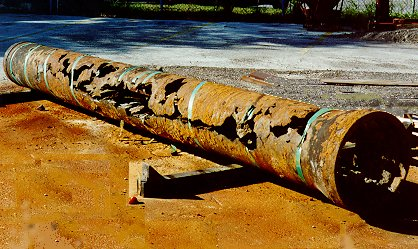 Menu
Menu
Know about Oil Soluble Corrosion Inhibitor & Alkylphenol Ethoxylate
There are two types of corrosion inhibitors, oil soluble and water-based. Oil-soluble products will dissolve in the oil phase of the production stream, while water-based products will stay suspended in water. Oil-soluble products are difficult to disperse in heavy brines. Moreover, they tend to be stickier than water-based products and better adhere to the wall of the tubing. So, which type of corrosion inhibitor is best?
Why Choose Oil Soluble Corrosion Inhibitor?
An oil-soluble corrosion inhibitor can be a useful tool for the prevention and mitigation of corrosion. However, the right inhibitor must be chosen according to the actual cause of the corrosion, cost versus benefit, and its interactions with the environment. Other organic inhibitors have lower efficiency but are costly, hazardous, and require careful attention in the synthesis process. As a result, an eco-friendly corrosion inhibitor is suggested to combat corrosion in steel structures. Oil soluble corrosion inhibitor displaces moisture from metal pores and recesses while leaving a thin, transparent film. It won't gum up, even in high-humidity conditions. It is non-conductive and won't harm plastics or paints, and it doesn't produce any harmful fumes when applied.
What are the Benefits of Oil Soluble Corrosion Inhibitors?
It is effective under extreme conditions, and the corrosion rate does not increase dramatically under or over dosage. The corrosion inhibitor must not form deposits on the metal surface and should suppress both localized and uniform corrosion. It should also be non-toxic and non-polluting, as this will prevent pollution.
The oil soluble corrosion inhibitor is designed to protect a wide variety of gas gathering and transmission systems, including high and low-flow crude oil pipelines. It provides excellent corrosion control under a wide range of conditions. It is available for continuous injection and batch treatment applications. The formulation is suitable for all types of corrosion in pipelines.

What is Alkylphenol Ethoxylate Biodegradation?
The biodegradation of alkylphenol ethoxylates is largely controlled by two main biological pathways. In the first, it undergoes central ether scission, where it is metabolized into a mixture of other organic compounds. The second biodegradation pathway, mediated by the enzymatic degradation of polyethoxylated nonylphenol, is characterized by a more streamlined metabolism.
What is the Environmental impact of Alkylphenol Ethoxylate?
The environmental impact of alkylphenol ethoxylates is largely unknown. These compounds can biodegrade in sewage treatment plants, and their main degradation products are alkyl phenoxy carboxylic acids and alkylphenols. Alkylphenols remain in the environment in the form of sediment, groundwater, and fish. Therefore, valid methods are needed to determine the levels of exposure in aquatic environments.
The Bottom Line
There are several advantages and uses for Oil Soluble Corrosion Inhibitor and Alkylphenol Ethoxylate. These are extremely valuable chemicals that are utilised in a variety of sectors due to their advantageous qualities, and the preceding FAQs will help you better comprehend their application.
